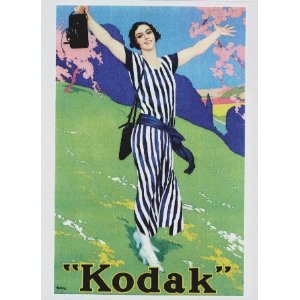Company Town
I've lived in the greater Rochester, NY area for over a decade, and while not my 'real' hometown, this mid-sized Western New York city has certainly has become my adopted hometown. And like many similarly sized and geographically situated cities, in the last 20 years or so Rochester has seen a kind of sea-change in its industrial base, demographic makeup, and general perception of itself, as well as the perceptions of outside observers. Rochester's situation and story in some ways is also being told and played out in places like Buffalo, Cleveland, Toledo, and others. The story is as familiar as it is depressing - the exodus or demise of traditional manufacturing firms, taking with them many thousands of decent-paying middle class jobs; a similar exodus of recent graduates from Rochester's numerous and excellent colleges as young people flock to the excitement of New York City and Chicago, or the opportunity and sunshine of California; and the general malaise that seems to overtake a Great Lakes city when the sun sets for the last time in October and doesn't seem to rise again until April. Vintage Kodak Ad - 1920s
Vintage Kodak Ad - 1920s
For over a hundred years Rochester has been known as the birthplace and hometown of Eastman Kodak, the legendary company founded in 1881, (not a typo, I promise), by George Eastman, and for most of its history, the global leader in imaging, cameras, and film processing. Kodak, itself an invented word, invented the concept of amateur or everyman photography. By developing and manufacturing cheap, mass-market cameras and film, Kodak made it possible and popular, for just about everyone to capture, chronicle, and pass on memories of people, places, events. As long ago as 1888, Kodak's slogan, 'You press the button, we do the rest', spoke to several succeeding generations of Americans who captured their own personal 'Kodak moments', as the snapshot became ingrained in the culture.
As time passed, Kodak continued to innovate and grow, eventually reaching almost every household in the country and employing at its apex about 145,000 employees, reaching about 90% in market share for film and cameras, and having revenues of $16 billion. But as is often the case with corporate giants that possess near-monopoly power and profits, a series of managerial mis-steps, failure to quickly assess and prepare for the rapid changes in the market and consumer preferences for new digital technologies, and the decision to protect the still very profitable if shrinking film business have all conspired to lead to what is now a precarious, teetering on bankruptcy situation for the once mighty Rochester icon.
I won't even attempt to delve into the specifics of Kodak's key failures of the last few decades, for this excellent piece from the Economist covers the saga in depth and better than I could. Rather I'd like to speculate on what, if anything, the idea of the 'Company Town' means in 2012. For over 100 years Kodak, (and really George Eastman himself), dominated the local economy, influenced community affairs, and by virtue of the incredibly high proportion of direct and indirect employment supported by Kodak, the day-to-day well being of the entire region. For a long, long time Kodak was Rochester and vice versa. Sure over time several other major corporations rose, (and have also fallen), in this city, but none ever rose so high and were so much a part of the essence of the community as Kodak. Everyone here has a friend or relative that at some point worked at Kodak.
Kodak's long and slow decline - with it shedding workers, closing facilities, spinning off divisions; has taken the element of surprise from its demise, but it has not made it any easier to accept. The likely end of Kodak as we have always known it, an American corporate legend, and in many ways the foundation of this community, will take with it more than the last few surviving employees and some landmark pieces of our downtown skyline. It will take a part of the city's soul with it as well.
No, Kodak's end is about much more than money or jobs or fodder for eventual business school case studies. It's mostly about a legacy and a memory of a different age, when organizations, their leaders, and their cities were much more intertwined and inextricable from one another. Kodak-Rochester, Rochester-Kodak; when you live here, you can't imagine one without the other.
But soon it seems like we will have to. Rochester, certainly, will carry on. There are already positive signs that Rochester will be just fine in the long run. And perhaps something of Kodak will survive after all. But either way the city of Rochester, and America, will have 130 years of memories.
Almost all of them taken by Kodak cameras, captured on Kodak film, and printed on Kodak paper.

 Steve
Steve

